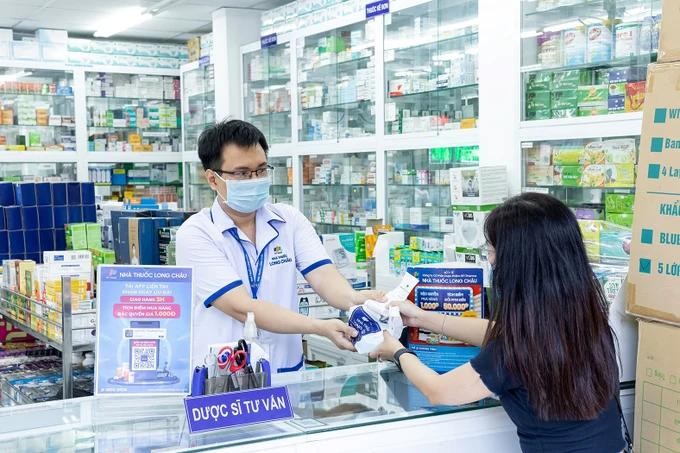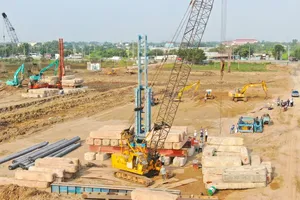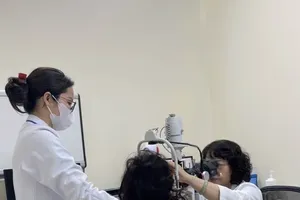
The healthcare watchdog claims to have strict control over drug prices, but the reality is that prices vary widely across different locations.
For instance, 46 year old patient Nguyen Van Hoang in Ho Chi Minh City’s District 3 was prescribed Lipanthyl (150mg) by his doctor to treat dyslipidemia, with a dosage of one pill a day. He must take the medication continuously for three months as per a physician’s prescription. During the first treatment period, he bought Lipanthyl (150mg) at a pharmacy near his house on Tran Dinh Xu Street, District 1 for VND17,000 a pill.
However, during the subsequent treatments, he decided to purchase it from Long Chau pharmacy on Pham Viet Chanh Street in District 1 as they offered a more affordable price of only VND11,330 per pill.
As per the Drug Administration's price declaration, Lipanthyl (150mg) is priced at VND11,618 per tablet.
Mr. Hoang angrily said that the cost disparity amounts to almost VND6,000for the identical category of medication. Should the treatment extend over a longer period, the patient may find themselves significantly financially burdened.
At three drugstores on Ni Su Huynh Lien Street in Tan Binh District, Fugacar chewable tablets from Thailand are priced between VND22,000 and VND27,000 per tablet. The Drug Administration Department had declared the price to be VND19,335 per tablet on June 12.
Meanwhile, at D.C. Pharmacy on Nguyen Thuong Hien Street, District 3, the Dofoscar pain reliever, fever reducer, and anti-inflammatory drug (containing 0.25mcg of calcitriol) is sold for 38,000 VND per packet, compared to the VND 30,000 per packet declared to the Ministry of Health.
Drug prices fluctuate wildly at pharmacies near hospitals. When a reporter inquired about Henex (a treatment for venous insufficiency) at H.P. Pharmacy on Su Van Hanh Street in District 10, near 115 People's Hospital, the price quoted was VND8,000 per pill, almost double the price at D.M. Pharmacy on Tran Hung Dao Street in District 5.
Meanwhile, the price declared to the Ministry of Health was only VND2,800 per pill. The pharmacy staff justified the higher price by claiming the drug was imported, despite the label clearly indicating it was manufactured by Abbott Healthcare Vietnam Company in Binh Duong Province.
According to a survey by the World Health Organization, although most of the costs are covered by health insurance in Vietnam, patients' out-of-pocket expenses for medical expenses still account for a fairly high proportion of 43 percent, and drug costs account for about 60 percent of treatment costs.
Based on the survey conducted by reporters, it was found that even though drug stores have adhered to listing and selling at the correct public price, this price significantly exceeds the regulated amount. On the other hand, patients find it hard to negotiate the cost of drugs, which are essential for their well-being; as a result, despite the high price, patients have no choice but to purchase them for the benefits of their health.
Associate Professor Pham Khanh Phong Lan, who serves as the President of the Ho Chi Minh City Pharmacy Association, said that, regulatory authorities have so far primarily focused on managing the prices of medications sold within hospital pharmacy systems, as outlined in the Ministry of Health’s Circular 15. This means that drugs are acquired at the winning bid price, which is subsequently published on the Drug Administration Department's portal. When these medications are sold, the profit margin is limited to a maximum of 2 percent to 15 percent.
In contrast, retail prices at independent pharmacies are determined by market competition, resulting in price variations among different stores. Associate Professor Pham Khanh Phong Lan expressed concern that the current management of drug prices is quite lax. The anticipated revision of regulations regarding drug price declarations, as per the amendments to the Pharmacy Law of 2016, is expected to enhance market price control.
In response to voters' concerns about drug prices in Ho Chi Minh City, Minister of Health Dao Hong Lan highlighted new measures to reinforce drug price control. Proposed by the Ministry in the draft amendments to the 2016 Pharmacy Law, which is under review by the National Assembly, these measures include announcement of expected wholesale drug prices, recommendation of published wholesale prices for prescription drugs, and declaration of prices for essential drugs as per the law.
Additionally, the Ministry of Health has made information on declared drug prices and winning bids at medical facilities available on the Drug Administration's website https://dichvucong.dav.gov.vn
This ensures that the public can access the information needed to compare and select drugs at reasonable prices.
HCMC studies building a rare drug reserve center
The People's Committee of Ho Chi Minh City has recently submitted a report to the Standing Committee of the Ho Chi Minh City People's Council regarding the management and utilization of pharmaceuticals within medical examination and treatment facilities, as well as pharmaceutical enterprises in the city.
In order to ensure a sufficient supply of medications for medical examinations and treatments, particularly for rare drugs, the city is exploring the establishment of a rare drug reserve center to address the treatment requirements of local medical facilities.
Additionally, there are plans to develop software that will enable the quick retrieval of emergency drug inventories at these facilities, with the objective of facilitating rapid access to medications during emergency situations.
























